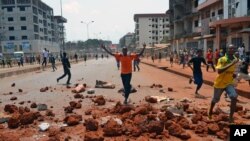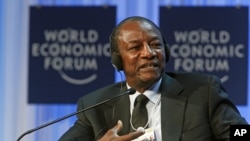DAKAR - Guinea's opposition called on its supporters to not go out or do business Friday in an effort to shut down the capital, Conakry. The opposition said it will hold daily protests against alleged fraud in the organization of much-delayed legislative elections until the government consents to dialogue. The movement kicked off Thursday with a march through the capital that descended into riots and clashes with security forces that injured at least 30 people.
Downtown Conakry was noticeably calm Friday after opposition leaders told their supporters to stay home. Several shops were closed, and traffic was minimal.
This is one of several strategies the opposition said it will use to push for an overhaul of the electoral commission and an audit of the voter list ahead of legislative polls.
The polls are seen as the final step of what has been a tumultuous transition to democracy following the 2008 military coup and 50 years of authoritarian rule.
Many fear disputes over the organization of the vote could result in a return to instability.
Cosmetics seller Fatimata Diallo said she is not going out Friday because she is afraid of more violence. She said people were throwing rocks Thursday. Diallo said people were hurt and cars were vandalized. She said even if the opposition had not called on them to stay home, she would not have gone to work. She added that she kept her children home from school Friday as well.
What was meant to be a peaceful opposition march on Thursday sparked violence that shut down the capital until mid-afternoon.
A VOA reporter on the scene said that security forces fired tear gas to disperse protesters. The reporter said clashes erupted between protesters and security forces, as well as between protesters and government supporters, when demonstrators tried to pass in front of the ruling party headquarters.
Opposition leaders say they suspect the government of trying to rig the vote in favor of President Alpha Conde's party.
Speaking to the crowd Thursday, opposition leader Cellou Dallein Diallo asked, "You aren't afraid of tear gas or even bullets, are you?," to which the crowd yelled, "No!"
Diallo said the marchers are calling for respect for their rights and that they will continue to protest until they achieve victory.
A VOA reporter saw at least 15 demonstrators being treated for injuries to the head, face and limbs at a clinic in the capital Thursday. Witnesses said security forces beat protestors with batons.
State police said Friday that 15 policemen were injured as well.
Guinea has a history of violent, and sometimes deadly, clashes between security forces and protesters.
No date is currently set for the legislative elections, which are already a year late. By law, they should have been held by May 2011, six months after the inauguration of President Conde.
The president once again pushed back the polls last week, which had been set for July 8. Conde cited "technical reasons" related to voter registration and revision of the voter lists.
The government has not responded to the opposition's demands.
A National Transition Council, put in place in 2010, continues to serve as the nation's parliament. Guinea last held legislative elections in 2002.
Downtown Conakry was noticeably calm Friday after opposition leaders told their supporters to stay home. Several shops were closed, and traffic was minimal.
This is one of several strategies the opposition said it will use to push for an overhaul of the electoral commission and an audit of the voter list ahead of legislative polls.
The polls are seen as the final step of what has been a tumultuous transition to democracy following the 2008 military coup and 50 years of authoritarian rule.
Many fear disputes over the organization of the vote could result in a return to instability.
Cosmetics seller Fatimata Diallo said she is not going out Friday because she is afraid of more violence. She said people were throwing rocks Thursday. Diallo said people were hurt and cars were vandalized. She said even if the opposition had not called on them to stay home, she would not have gone to work. She added that she kept her children home from school Friday as well.
What was meant to be a peaceful opposition march on Thursday sparked violence that shut down the capital until mid-afternoon.
A VOA reporter on the scene said that security forces fired tear gas to disperse protesters. The reporter said clashes erupted between protesters and security forces, as well as between protesters and government supporters, when demonstrators tried to pass in front of the ruling party headquarters.
Opposition leaders say they suspect the government of trying to rig the vote in favor of President Alpha Conde's party.
Speaking to the crowd Thursday, opposition leader Cellou Dallein Diallo asked, "You aren't afraid of tear gas or even bullets, are you?," to which the crowd yelled, "No!"
Diallo said the marchers are calling for respect for their rights and that they will continue to protest until they achieve victory.
A VOA reporter saw at least 15 demonstrators being treated for injuries to the head, face and limbs at a clinic in the capital Thursday. Witnesses said security forces beat protestors with batons.
State police said Friday that 15 policemen were injured as well.
Guinea has a history of violent, and sometimes deadly, clashes between security forces and protesters.
No date is currently set for the legislative elections, which are already a year late. By law, they should have been held by May 2011, six months after the inauguration of President Conde.
The president once again pushed back the polls last week, which had been set for July 8. Conde cited "technical reasons" related to voter registration and revision of the voter lists.
The government has not responded to the opposition's demands.
A National Transition Council, put in place in 2010, continues to serve as the nation's parliament. Guinea last held legislative elections in 2002.





